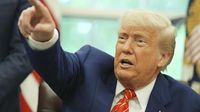Former President Donald Trump has called for an immediate and unconditional 30-day ceasefire in the ongoing conflict between Russia and Ukraine, emphasizing the importance of peace negotiations. In a post on Truth Social on May 8, 2025, Trump warned that failure to adhere to the ceasefire would result in sanctions from the United States and its allies.
Trump's appeal came after a phone conversation with Ukrainian President Volodymyr Zelensky, during which the two leaders discussed the prospects of a ceasefire. Trump stated, "The United States is calling for, ideally, a 30-day unconditional ceasefire," and expressed hope that both countries would respect the sanctity of direct negotiations.
He stressed the need for a ceasefire to ultimately lead to a peace agreement, declaring, "Everything can be done very quickly, and I will be available at any moment if my services are needed." This marked Trump's first communication with Zelensky since they met at the funeral of Pope Francis.
Zelensky responded positively to Trump's proposal, indicating that a 30-day ceasefire would be a genuine indicator of progress toward peace. He reiterated Ukraine's readiness to implement the ceasefire immediately, stating, "From this day, from this moment, Ukraine is ready for a full 30-day ceasefire." Zelensky dismissed a Russian proposal for a three-day ceasefire, labeling it meaningless and emphasizing that the 30 days could serve as the beginning of years of peace.
The context of Trump's call for a ceasefire is significant, as it follows a series of escalating tensions in the region. The conflict, which has seen significant military and civilian casualties, has prompted international calls for a resolution. Trump, who has expressed a desire to remain involved in the peace process, highlighted the necessity of collaboration with European partners.
However, not all U.S. officials share Trump's enthusiasm for a ceasefire. J.D. Vance, Vice President and a key figure in the administration, voiced skepticism during a conference in Washington on May 7, 2025. He argued that since Russia views the ceasefire as contrary to its strategic interests, the U.S. should move beyond the fixation on a 30-day ceasefire and focus instead on a long-term solution.
Vance criticized Russia for its excessive demands, including attempts to gain control over territories it does not occupy. In a subsequent interview with Fox News on May 8, he reiterated that if Moscow does not approach negotiations seriously, the U.S. may reconsider its role as mediator in the conflict.
This divergence in approach highlights the complexities of U.S. foreign policy regarding the Russia-Ukraine conflict. While Trump emphasizes immediate action and a temporary truce, Vance's comments suggest a preference for a more strategic, long-term resolution.
The conversation between Trump and Zelensky occurred shortly after the Ukrainian parliament approved a raw materials agreement with the United States, signaling ongoing cooperation between the two nations. The approval of this agreement underscores the multifaceted nature of U.S.-Ukraine relations, which include military aid, economic support, and diplomatic engagement.
As the situation evolves, both Trump and Zelensky have expressed a commitment to seeking peace, albeit through different lenses. Trump’s insistence on a ceasefire reflects his broader strategy of re-engagement in international diplomacy, while Vance’s caution suggests a more measured approach to negotiations with Russia.
The international community is watching closely as the potential for a ceasefire unfolds. The implications of a 30-day truce could be profound, not only for the immediate conflict but also for the future of U.S.-Russia relations. Should both sides agree to the ceasefire, it might pave the way for more substantive discussions on a lasting peace.
In summary, Trump's call for a ceasefire has reignited discussions around the ongoing conflict in Ukraine, with Zelensky expressing readiness to comply. However, the contrasting views within the U.S. government reflect the challenges ahead in achieving a consensus on how best to approach the situation.





